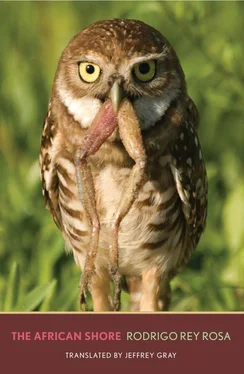“Bismil-láh,” said Rashid and took a sip of tea.
The crazy young woman in uniform popped her head in from the street to ask for money.
“Give her something,” Rashid suggested. He obeyed, taking a five-dirham coin from his pocket and dropping it in her outstretched hand.
“Báraca l-láh u fik,” she said, and with a bow to Rashid, left the café.
Rashid smiled with satisfaction.
“That’s good,” he said. “She’s a good woman.”
Half an hour later, he left the café with a ball of kif bulging in his pocket. On the way to the pension, he stopped at a stand to buy some cigarettes; he asked for the cheapest brand.
The honorary consul’s gardener opened the door for him and pointed the way up the stairs to the waiting room. The suitcase was behind the door, where he had left it, but the cage was no longer on the chest. From the dining room, accessible by a little spiral staircase, came the smell of coffee and the voices of the consul and Morad, the friend from Rabat, having an after-dinner talk. They were speaking English.
“He’s certainly not bad. I already told you I was interested in him,” said the consul. “Very interested. You’ve seen him, haven’t you?”
“Does he have any money?”
“How would I know? It’s not his money that interests me.”
The other laughed.
“Well, then, what?”
“I know where you’re going with this. Don’t worry. He just seems like someone with whom one can have a conversation. That’s important to me.”
“A conversation about what? Owls?” The Moroccan laughed. “What do you know about why he’s here? He wouldn’t tell you if it’s what I think. How much do you think it’ll cost?”
Hearing all this, he was confused and wondered whether to go up to the dining room or to stay where he was. But he heard the noise of chairs moving and decided to go back down the flight of stairs toward the front door. He started down slowly. Then he heard steps coming down the spiral staircase. So he turned and walked up again, decisively, toward the waiting room.
“ Hombre, so you’re here,” said the consul, giving him his hand.
Morad looked to be twenty years old; he was dressed in European clothes with considerable style. The consul introduced them.
“Where’s the owl?” he asked, as nicely as he could.
“In the garden. Don’t worry. We put a blanket over it. Yes. They hate the daylight.”
“What are you going to do with it?” asked Morad with an Andalusian lilt.
“Let it go, I suppose.”
“Let it go? No, you should give it to me,” Morad said.
The consul smiled.
“Come, come,” he said. “Nothing will happen to it. Look, I’ll explain. Morad has fallen in love with the owl. He adores it. He wants it to be his. Do you understand? And he’s prepared to pay for it. How much is it worth?”
“It’s not for sale.”
“But he’s very interested.”
“Really?” He smiled. “How much could he pay?”
The consul turned to Morad.
“It’s for my uncle that I want it. He has a collection of birds. He has several owls, with and without ears. He’d like this one, I’m sure. I could give you as much as a thousand — dirhams, I mean, certainly not dollars!”
He thought a moment, then shook his head.
“Thanks very much,” he added a second later.
The Moroccan touched himself at the pit of his stomach. Then he moved his hand vaguely and managed to say politely:
“It’s an honest offer.”
“I don’t say it isn’t,” he replied. Now he could permit himself the luxury of being affable. “But I don’t like the idea of this owl being part of some collection.”
“Ah, I understand,” said the Moroccan. There was something faintly menacing in his voice. “It’s because of that.”
“One can always change one’s mind,” said the consul, trying to be diplomatic.
Morad smiled, but the smile did not add up to a smile.
“Have you found lodging?” asked the consul.
“Yes, I was lucky.”
“Splendid. And now I suppose you want your bird, eh?” He leaned his head toward the stairs and shouted, “Mohammed! Mohammed! The gentleman’s bird.”
With the weight of the suitcase on his shoulder and the caged owl in the other hand, he walked down Riad Sultán Street alongside the wall that bordered the Casbah on the ocean side. On the plaza of the Casbah, under the walls of the old prison, a group of Spanish tourists had gathered. A guide wearing a white djellaba and a fez was telling them about King Alfonso VI, who had given Tangier as his sister Catarina’s dowry to Charles II of England. Several begging children circled among the tourists, kissing their hands, their sleeves, and the folds of their shirts.
He entered the Medina by the Bab el Bahr, the seaside gate, and turned onto a downgrade lane toward Ben Rasuli Street, where a boy with a shaved head began to run beside him. The boy stuck out his hand to ask for money. “No,” he said. “No, not now.” “Give me dirham. Poor. Poor. To eat.” He made a gesture as if to put something in his mouth and then he grabbed his sleeve and brought his lips close to it. “No!” But the boy held onto his shirt with an unexpected strength, and even though he gave a sharp tug to free himself, he couldn’t. “Let go, now!” he shouted. At that moment another Moroccan boy, older than the first, came up on his right and, giving him a shove, seized the cage and began to run with it downhill.
“Hey! Stop! Thief!” he shouted, and, striking the first boy, got free of him and started running after the thief.
He didn’t know the little streets, but he could hear the sound of the thief’s footsteps.
Once he made a wrong turn up a dead-end street, but an old man fixing a tin teapot in the recess of a wall pointed the way to him, and, doubling back, he was just able to see the thief turning a corner a few yards down the labyrinth. The owl’s cage banged a wall leaving a groove in the stucco. I’ll never catch him carrying this suitcase, he thought. He came out into a long sloping street and saw the thief running hard a few meters below. He stopped, breathless and now resigned, telling himself that Morad couldn’t have had time to send the boy to steal the bird, when he saw that, at the bottom of the street, turning sharply to go up a side path, the thief had slipped and fallen hard on his back, his legs in the air. The owl’s cage had flown up in the air and fallen in front of the door of a carpet vendor, who stuck his head out to see what was happening. He yelled again: “Hey! Thief! That man’s a thief!” and ran down the street. The thief got up quickly and disappeared, leaving the cage where it landed, a few steps from the skid marks.
Attup, the bear-like Muslim who worked as receptionist at the Pension Calpe, raised no objection to the owl, but he wanted to see a passport. An ATM card and a Colombian driver’s license satisfied him for the moment. Attup spoke almost no Spanish, but with gestures and a few French words, he let him know it was not a good idea to be without a passport. Lately, he explained, the gendarmes had been making raids on the little hotels of the Medina, rounding up undocumented aliens — mostly Africans from Mali or Senegal who came to Tangier in the hope of getting to Europe, crossing the straits of Gibraltar. The police could give him problems, Attup said. He should pay a visit to the commissariat, where they would give him a temporary identity card.
“Thanks very much. I’ll do it right away.”
“Joli oiseau,” said Attup. “Vraiment joli.”
Attup accompanied him to his room on the second floor and gave him his key. He laid the suitcase on the bed and set the cage at the foot of an old radiator under the window. He followed Attup down the stairs to the table by the staircase, which served as reception desk, and asked him where he could find the nearest commissariat. In the new sector, said Attup. He advised him to take some photos also, as they would be necessary. He pointed out a photographer’s studio not far from the pension.
Читать дальше












